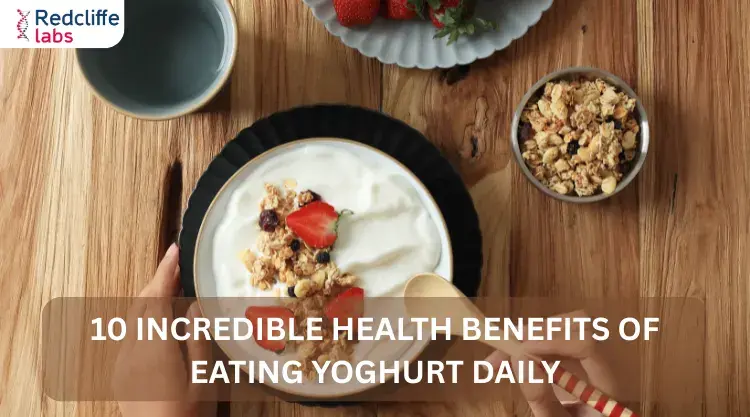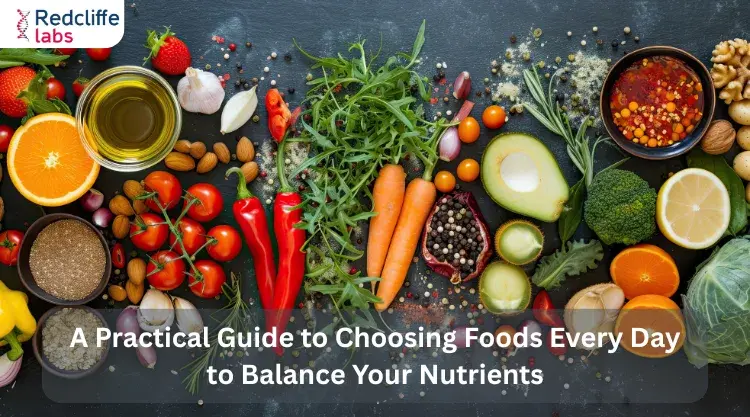Top Vitamin-D Fruits and Vegetables for a Healthy Diet

Medically Reviewed By
Prof. Ashok Rattan
Written By Muskan Taneja
on Oct 21, 2024
Last Edit Made By Muskan Taneja
on Jul 19, 2025

Vitamin D fruits and vegetables top the list when somebody talks about a balanced diet. Your body needs vitamins and minerals for proper functioning. Vitamin D is one such beneficial vitamin that keeps bones strong. The body produces vitamin D as a response to sun exposure. Certain foods and supplements are unimpeachable sources of vitamin D.
Vitamin D fruits support the overall body by building immunity, reducing inflammation, and boosting brain health. Vitamin D has an overall benefit on the body. The right amount of vitamin D can prevent illness and infections. In today’s blog, let’s know the 20 best fruits and vegetables with the highest vitamin D content.
What’s The Role of Vitamin D in The Body?
Vitamin D is a fat-soluble vitamin that provides the correct amount of calcium, magnesium, and phosphorus in the body. Vitamin D is present in sunlight, food, fruits, and vegetables, essential for various bodily functions.
Apart from eating, you can enjoy vitamin D fruit juice. This element can boost the immune system, reduce inflammation, build bone health, and aid digestion and calcium absorption.
Research has proven that vitamin D influences the immune system and manages immune cell functioning. Vitamin D can lower the risks of heart diseases and coronary artery diseases such as hypertension and heart failure.
Experts claim that the correct amount of vitamin D can suppress risks of autoimmune conditions such as multiple sclerosis and rheumatoid arthritis. A study found that vitamin D can maintain optimal mental health.
A meager amount of vitamin D can increase the risk of depression, cognitive decline, and seasonal affective disorder (SAD). Some experts argue that vitamin D might influence the functioning of neurotransmitters and promote neuroprotective processes within the brain.
Vitamin D is present in several fruits and vegetables; however , it exposes your body to sunlight for approximately 10-30 minutes, twice or thrice weekly. However, the necessary intake may vary on several factors, such as location, age, gender, and race.
10 Benefits of Vitamin D Fruits in Day-to-Day Functioning
Vitamin D can benefit your day-to-day functioning in several ways. You can grab the following benefits of vitamin D through fruits and vegetables.
- Vitamin D promotes the absorption of calcium and phosphate, supporting bone and teeth health.
- Sufficient vitamin D can reduce the chances of severe health conditions such as osteoporosis.
- Vitamin D supports a healthy immune system, reducing the risks of autoimmune diseases, respiratory infections, and certain cancers.
- Studies reveal that vitamin D can reduce the risks of hypertension by managing the renin-angiotensin-aldosterone system.
- Vitamin D can lower LDL cholesterol and increase HDL cholesterol. Research says ideal vitamin D levels can control cholesterol levels in the body.
- Some studies prove that vitamin D can lower the chances of asthma. However, several investigations and research are supporting better regulation of asthma symptoms.
- Vitamin D levels have a connection to psychological well-being and mood swings. Studies have proven that sufficient levels of vitamin D can reduce depression.
- Vitamin D can decrease the risks of chronic diseases such as diabetes, heart disease, rheumatoid arthritis, and certain cancers.
- Vitamin D may act as a hormone and control over 200 genes. These genes control cell growth and DNA restoration.
- Vitamin D can regulate the impact of cardiac muscles in the heart and ensure overall cardiac function.
20 Best Vitamin D-Rich Fruits and Vegetables
Vitamin D is crucial for maintaining healthy bones and a strong immune system. Still, it is primarily obtained from sunlight exposure and animal-based foods like fish, eggs, and fortified products. Plant-based sources of vitamin D are relatively limited. While the following fruits and vegetables don't contain significant amounts of vitamin D themselves, they contribute to overall health and enhance the body's ability to absorb or synthesize vitamin D. Here's an overview of 20 fruits and vegetables often associated with supporting vitamin D metabolism:
- Avocado
- Kiwi
- Orange
- Bananas
- Figs (anjeer)
- Guava
- Papaya
- Watermelon
- Amla
- Mushrooms
- Spinach
- Bitter gourd
- Bottle gourd
- Sweet potato
- Pumpkin
- Broccoli
- Okra (bhindi)
- Green peas
- Pineapple
- Amaranth leaves
- Avocado- Avocados are rich in healthy fats that aid the absorption of fat-soluble vitamins, including vitamin D. They are also high in magnesium, which helps activate vitamin D.
- Kiwi- A wonderful source of vitamin C and antioxidants, kiwi supports immune health and collagen production, indirectly contributing to better vitamin D utilization in the body.
- Oranges- Oranges contain an outrageous amount of vitamin C, an important nutrient for immune function and skin health, but commercial juices often add vitamin D to them, making them a possible indirect source of the vitamin.
- Bananas- Bananas are rich in magnesium and potassium, which help with muscle and bone health. Magnesium is vital for converting vitamin D into its active form.
- Figs (Anjeer)- Globally, figs are popular for their calcium content. Figs help maintain bone health, synergizing with vitamin D for calcium absorption and development.
- Guava- Guava contains vitamin C, which helps the immune system. This property also supports the absorption of various minerals that work with vitamin D to maintain strong bones and skin health.
- Papaya- This tropical fruit contains vitamins A and C, fiber, and antioxidants—these nutrients aid in reducing inflammation and supporting immune function, which can indirectly benefit vitamin D metabolism.
- Watermelon- Watermelon has a high water content and helps hydrate the body. It is also a wonderful source of antioxidants, which are beneficial for overall health and immune function, indirectly influencing vitamin D usage.
- Amla- Indian gooseberry, or amla, is extremely high in vitamin C. A strong immune system can improve how the body uses vitamin D, particularly for skin health.
- Mushrooms- One of the few natural plant sources of vitamin D, especially when exposed to sunlight. Mushrooms, particularly shiitake and maitake, produce vitamin D2, which can help supplement vitamin D levels.
- Spinach- While it doesn’t provide vitamin D, spinach is rich in calcium, magnesium, and iron. The high calcium content works in tandem with vitamin D for bone health.
- Bitter Gourd- Bitter gourd supports digestion and is rich in antioxidants, vitamins A and C, all of which contribute to the general health that aids vitamin D's effectiveness.
- Bottle Gourd- People know bottle gourd for its hydrating properties. Bottle gourd is low in calories and contains magnesium and vitamin C, promoting skin and bone health and supporting vitamin D's function.
- Sweet Potato- Sweet potatoes are rich in magnesium and vitamin A, which can promote better absorption of vitamin D and help with bone health.
- Pumpkin- Pumpkin is high in vitamin A and antioxidants, supporting overall immune function and skin health. While it doesn't contain vitamin D, it contributes to a balanced diet that aids vitamin D's role.
- Broccoli- Broccoli contains nutrients, calcium, vitamin K, and antioxidants, which help maintain healthy bones and support the body's utilization of vitamin D.
- Okra (Bhindi)- Okra is an excellent source of magnesium, calcium, and fiber, all beneficial to bone health. The magnesium content is important for activating vitamin D in the body. If vitamin D is deficient, add Bhindi to your diet at least one meal.
- Green Peas are rich in vitamin K and other minerals supporting bone health. While they don’t contain vitamin D, they complement a diet that enhances bone metabolism. Add green peas with potato and prepare a tasty curry. Enjoy it with 1 chapati or rice.
- Pineapple- Pineapples are a rich source of vitamin C and manganese, which support healthy bones and the immune system, indirectly helping the body process vitamin D efficiently. Have it peeled, sliced, and raw or in juice form, the effects are the same.
- Amaranth Leaves- Calcium, iron, and vitamins A and C are abundant in amaranth leaves, making them excellent for enhancing bone health and immune function. The high calcium content helps the body in using vitamin D effectively.
What Can Lead To Vitamin D Deficiency?
Lack of sun exposure is one reason for vitamin D deficiency. However, some people develop deficiencies because of various factors, such as age, skin color, breastfeeding, body weight, medical history, and gastric bypass surgery.
How can you identify the vitamin D deficiency?
Vitamin D deficiency can lead to hyperparathyroidism, which creates a hormone imbalance that raises calcium levels in the blood. Common symptoms identified as vitamin D deficiency include joint pain, bone pain, muscle weakness, and abnormality in bone development or the teeth.
Recommended Dose of Vitamin D
The recommended dose of vitamin D differs based on age, gender, and race. Here is the correct daily dose of vitamin D.
| Age Group | Recommended Daily Dosage |
| Infants - 12 months | 10 mcg |
| 1 year to 18 years | 15 mcg |
| 19 years to 70 years | 15 mcg |
| 70 years and above | 20 mcg |
| Pregnant or lactating women | 15 mcg |
What Are The Risks Of Excessive Vitamin D Consumption?
Excessive vitamin D can lead to hypercalcemia, which can cause:
- Bone pain
- Loss of appetite
- Weakness
- Dizziness
- Fatigue
- Dehydration
- Excessive urination
- Kidney stones
- Confusion
- Apathy
- Excessive thirst
- Nausea or vomiting
- Harden soft tissues may lead to coma.
Key Takeaways
Vitamin D is important for enhancing overall health. It can boost immunity and maintain strong bones and teeth. Vitamin D in sufficient amounts can be extremely beneficial. Sunlight is the primary source of vitamin D. However, vitamin D fruits and vegetables can reduce depression, control mood swings, and prevent severe life-threateninging conditions. Excessive amounts of vitamin D may negatively affect your body, so make sure you have it in the recommended daily dosage.



